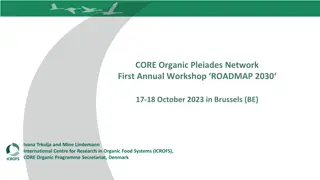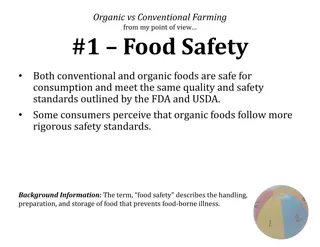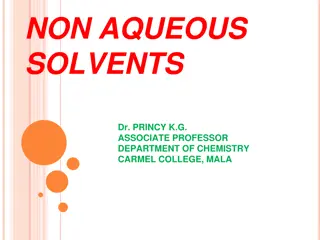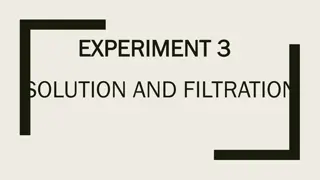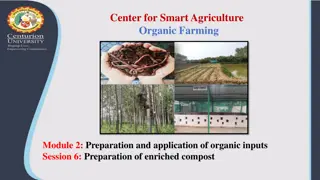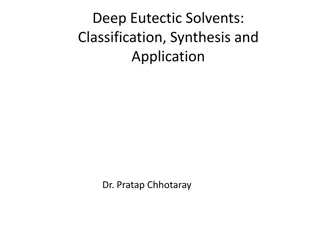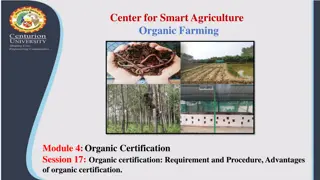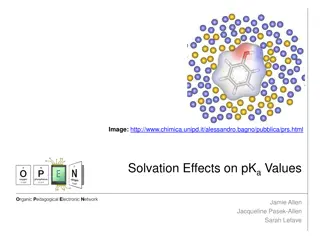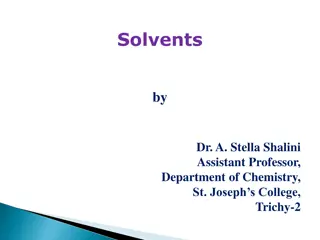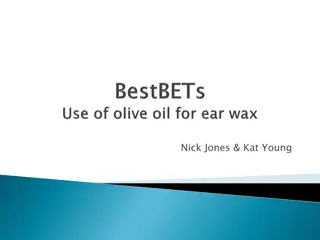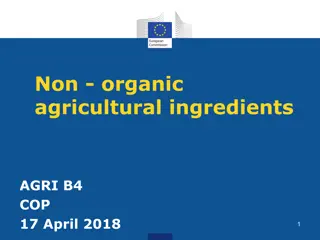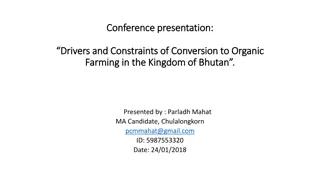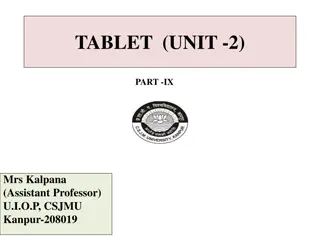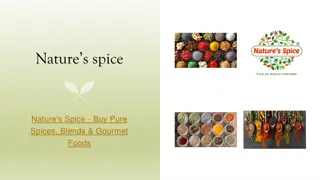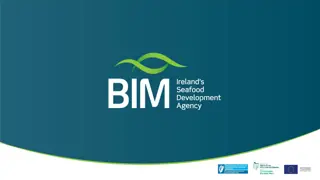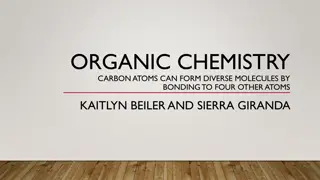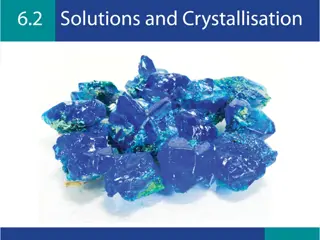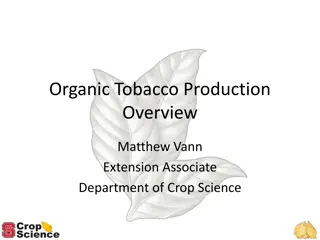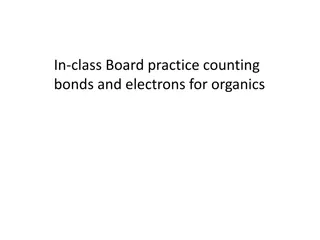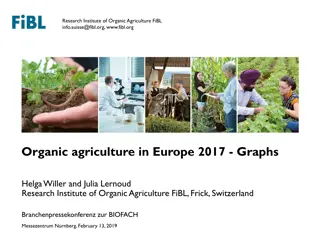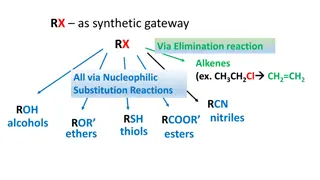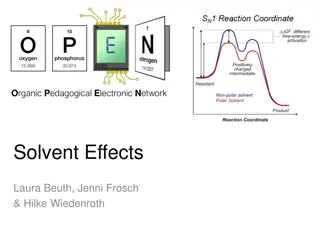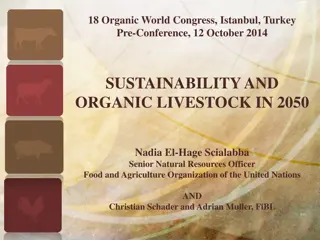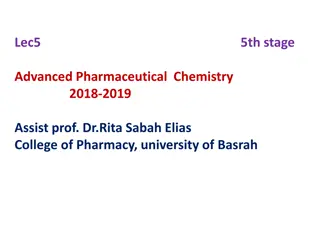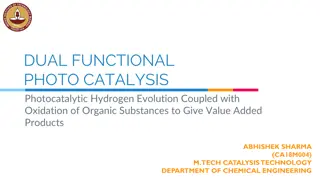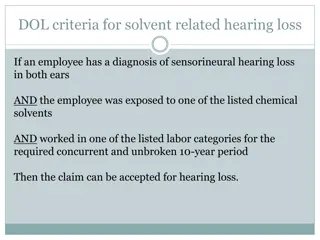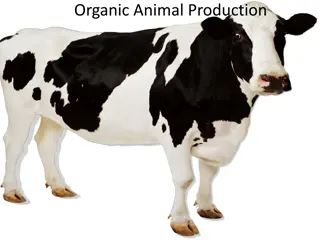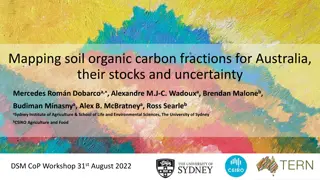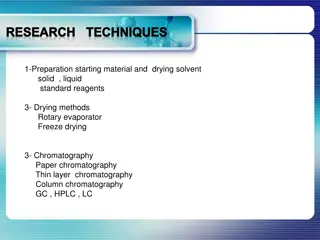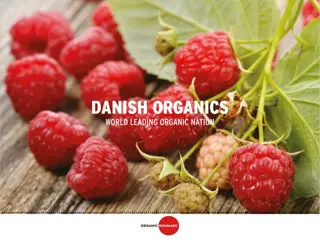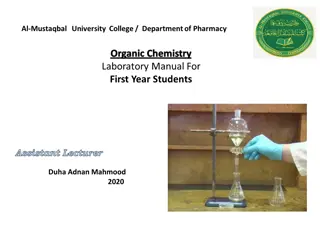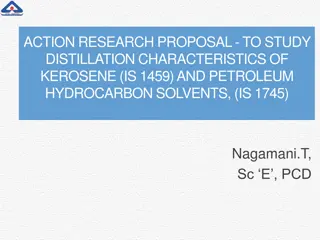CORE Organic Pleiades Network First Annual Workshop Roadmap 2030 - Event Recap
The CORE Organic Pleiades Network held its first annual workshop in Brussels, focusing on organic research and innovation in the European agri-food sector. The event discussed HEU partnerships, national/regional action plans, research funding, and more. CORE Organic aims to enhance knowledge and inn
0 views • 37 slides
Understanding the Diels-Alder Reaction in Practical Organic Chemistry
The Diels-Alder reaction is a fundamental method in organic chemistry for producing cyclic organic compounds by combining a conjugated diene with an alkene. This reaction, named after Otto Diels and Kurt Alder, involves the formation of a six-membered ring with specific bond rearrangements. Conjugat
4 views • 15 slides
Organic vs Conventional Farming: An Overview
In the debate between organic and conventional farming, both methods have their pros and cons. While organic foods are perceived to follow stricter safety standards, both types meet FDA and USDA regulations. They offer similar nutritional value, but organic farming tends to have lower efficiency due
0 views • 6 slides
Understanding Non-Aqueous Solvents: Types and Classification
Inorganic non-aqueous solvents play a crucial role in chemical research and industry. This article by Dr. Princy K.G. delves into the classification of solvents based on protonicity, polarity, and aqueous vs. non-aqueous nature. It explores the types of non-aqueous solvents, such as protonic and non
1 views • 29 slides
Separation and Purification of Organic Compounds: Methods and Techniques
The separation and purification of organic compounds are essential processes to obtain pure products, as impurities and side reactions can affect the quality of the compounds. Methods such as solution and filtration, crystallization, distillation, extraction, sublimation, and chromatography are comm
8 views • 15 slides
Enhancing Compost Quality for Organic Farming: Phosphorous-Enriched Compost Preparation
Composting is a natural process crucial for organic farming. Enriched compost improves nutrient supply to crops. Learn how to prepare phosphorous-enriched compost using organic wastes, bio-inoculants, and rock phosphate. Follow a method involving layering organic materials, cow dung, and rock phosph
3 views • 8 slides
Deep Eutectic Solvents: Classification, Synthesis, and Applications
Deep Eutectic Solvents (DES) are versatile solvents formed by mixing specific acids and bases. These solvents exhibit unique hydrogen bonding properties, resulting in a lower melting point compared to individual components. DES can be classified into hydrophobic and hydrophilic types, each with dist
3 views • 7 slides
Understanding Organic Certification and NPOP in India
Organic certification is crucial for ensuring the quality and authenticity of organic products. This involves adhering to strict production standards and undergoing periodic inspections. In India, the National Programme on Organic Production (NPOP) plays a significant role in certifying organic comm
0 views • 10 slides
Insights into Solvation and Polarizability Effects on pKa Values in Organic Chemistry
Learn about how solvation effects and polarizability impact the pKa values of charged molecules in organic chemistry. Solvents can stabilize charges, while polarizability influences the spread of charge in molecules. Discover how conjugate base and acid stabilization play key roles in determining pK
0 views • 8 slides
Solvents for Chemistry Enthusiasts
Explore the power of solvents with Dr. A. Stella Shalini, Assistant Professor of Chemistry at St. Joseph's College, Trichy-2. Learn about the properties of water as a universal solvent, its ability to dissolve substances like salt, and non-aqueous solvents such as liquid ammonia. Discover the classi
0 views • 8 slides
Management of Symptomatic Ear Wax in Adults: Olive Oil Drops vs. Alternative Solvents
Adults (>18 yrs) presenting with symptomatic ear wax often seek interventions like olive oil drops or alternative ear wax solvents. A study compared the efficacy of olive oil drops in conjunction with syringing versus alternative treatments or no treatment. PubMed search yielded 26 papers, with 2 re
5 views • 12 slides
Concerns and Recommendations on Non-Organic Agricultural Ingredients
Various Member States express concerns about the inclusion of new non-organic agricultural ingredients in Regulation 889/2008 Annex IX, emphasizing the need to maintain the integrity of organic production. Suggestions include keeping the list as short as possible, searching for organic alternatives,
0 views • 19 slides
Exploring Drivers and Constraints of Conversion to Organic Farming in Bhutan
Population in Bhutan heavily relies on agriculture, but the transition to organic farming has been slow despite the desire to reduce chemical use. This presentation investigates the current state of organic farming, identifies key factors affecting conversion, and offers policy recommendations to pr
0 views • 22 slides
Understanding Coating Composition for Tablets: A Guide by Mrs. Kalpana, Assistant Professor
Mrs. Kalpana, an Assistant Professor at U.I.O.P., CSJMU, Kanpur, delves into the components of tablet coating composition including solvents, plasticizers, colorants, and opaquant-extenders. Solvents are crucial for dissolving polymers, while plasticizers modify film quality. Colorants add elegance
1 views • 10 slides
organic chana masala
Nature\u2019s Spices Organic Chana Masala is a meticulously curated blend of organic spices, crafted to elevate the flavor of chickpea dishes. Sourced from certified organic farms, our masala blend is free from additives and artificial ingredients, e
1 views • 6 slides
Overview of Global Farmed Salmon and Organic Production
The data showcases the production figures for global farmed salmon across various countries, with Norway leading the production, followed by Chile, Scotland, and others. Additionally, insights into the growing organic salmon production, vulnerabilities in the sector, and details on organic mussels p
0 views • 9 slides
Understanding Organic Chemistry: Carbon Atoms and Molecular Diversity
In organic chemistry, carbon atoms can form diverse molecules by bonding to four other atoms, leading to molecular complexity and diversity. The versatile nature of carbon allows for the formation of various carbon skeletons, contributing to the vast array of organic compounds. Hydrocarbons, consist
0 views • 12 slides
Organic chicken masala
Organic Chicken Masala is a meticulously blended combination of premium organic spices, designed to elevate the taste and aroma of chicken dishes. Sourced from certified organic farms, our masala guarantees purity and is free from chemicals and pesti
1 views • 6 slides
Understanding Solutions and Solubility in Chemistry
Explore the concepts of solutions, solvents, solutes, and solubility in chemistry through investigations with various substances and solvents. Learn how to differentiate between dilute, concentrated, and saturated solutions, measure solubility, create solubility curves, and understand crystallizatio
0 views • 36 slides
Guide to Organic Tobacco Production Process
Understand the process of organic tobacco production including obtaining a contract, certifying land, inspections, maintaining certification, selling leaf, and transitioning from conventional to organic production. Get insights on organic certification through USDA-National Organic Program, required
0 views • 18 slides
Development of Presumption Criteria for Solvent-Induced Hearing Loss
Development of a presumption criteria by the Department of Labor (DOL) for identifying the exposure-disease relationship in cases of solvent-induced hearing loss. The DOL requires a diagnosis of sensorineural hearing loss in both ears, exposure to specific solvents, and a history of working in desig
0 views • 7 slides
Understanding Bonds and Electrons in Organic Compounds
Explore the world of organic chemistry by delving into the concepts of bonds, electrons, and their roles in determining properties of organic compounds. Discover why saturated fats are considered unhealthy, learn about bond energies, lengths, and orders, and unravel the mysteries of organic compound
0 views • 13 slides
Overview of Organic Agriculture in Europe 2017
Europe has seen a significant increase in organic farmland and retail sales in 2017. With 2.9% of Europe's farmland being organic, totaling 14.6 million hectares, countries like Spain, Italy, and France lead in organic farming. In terms of retail sales, Denmark and Switzerland stand out with high pe
0 views • 9 slides
Applications and Industrial Production of Fermentation in Various Sectors
Fermentation plays a crucial role in the production of organic solvents, food products, condiments, dairy products, processed meats, beverages, vitamins, and pharmaceutical compounds like antibiotics and vaccines. Specific examples include the production of citric acid, lactic acid, monosodium gluta
0 views • 6 slides
Understanding Chromatography: A Practical Experiment
Chromatography is a process used to separate components of a mixture by employing a mobile phase that carries the mixture through a stationary phase. This experiment by Mariam Nimri explores the effects of different solvents on chromatography results, with a hypothesis that vinegar can impact pigmen
1 views • 10 slides
Nucleophilic Substitution Reactions: Factors Affecting SN2 Reactivity
Understanding the factors influencing SN2 reactions in synthetic gateways involving elimination reactions of alkenes is crucial for predicting reaction rates. This includes analyzing the impact of solvent types on reaction rates in different scenarios. Polar protic solvents and polar aprotic solvent
0 views • 19 slides
Understanding Solvent Effects in Organic Chemistry
Different solvents can have varying effects on chemical reactions by influencing solubility, stability, and reaction rates. Solvents can control the pathway towards forming either thermodynamic or kinetic products based on their selection. Solutes dissolve based on intermolecular interactions with s
0 views • 6 slides
Insights into U.S. Organic Industry Trends and Outlook
The U.S. organic industry is experiencing positive consumer demand growth, with organic food sales reaching $56 billion in 2020. Despite a decline in organic dairy sales, the overall organic acreage growth remains strong. The market faces challenges such as the impact of COVID-19, the need for produ
0 views • 12 slides
Sustainability and Organic Livestock Modeling for Global Food Security
The research presented at the 18th Organic World Congress in Istanbul delves into the Sustainability and Organic Livestock (SOL-m) modeling approach developed by FAO and FiBL. The study aims to explore the potential impacts of global conversion to organic livestock production by 2050 on food securit
0 views • 25 slides
Understanding Solvents in NMR Spectroscopy
Solvents play a crucial role in NMR spectroscopy, with characteristics like chemical inertness and lack of hydrogen atoms being key. Deuterated solvents are commonly used, but even they may show peaks due to impurities. Different deuterated solvents have varying chemical shifts and multiplicities fo
0 views • 15 slides
Promoting Participatory Guarantee Systems (PGS) for Small Scale Organic Farming in Thailand
The project aims to strengthen organic agriculture communities in Thailand through the establishment of Participatory Guarantee Systems (PGS) as an alternative to third-party certification. PGS advocates for market and government recognition, focusing on quality assurance, trust, and knowledge excha
0 views • 13 slides
Dual-Functional Photo Catalysis: Hydrogen Evolution & Organic Oxidation
The research explores dual-functional photo catalysis, combining hydrogen evolution with the oxidation of organic substances to produce value-added products. It focuses on utilizing photoelectricity to create electrons for hydrogen production and organic molecule oxidation. The study investigates th
0 views • 14 slides
Criteria for Solvent-Related Hearing Loss and Compensation Claims
The Department of Labor (DOL) has specific criteria for accepting claims related to solvent-induced hearing loss in employees. If an employee has sensorineural hearing loss in both ears, was exposed to certain chemical solvents, and worked in particular job categories for a concurrent 10-year period
0 views • 8 slides
Organic Animal Production in the US: Insights and Statistics
Organic animal production in the US involves raising livestock and poultry through natural practices without antibiotics or hormones. Animals are fed organic feed and have access to outdoor spaces to mimic natural behavior. Statistically, over 5 million acres of land are certified for organic animal
0 views • 19 slides
Mapping Soil Organic Carbon Fractions in Australia: Stocks and Uncertainty
This study by Mercedes Román Dobarco et al. focuses on mapping soil organic carbon fractions across Australia, including mineral-associated organic carbon, particulate organic carbon, and pyrogenic organic carbon. The research involves prediction of soil organic carbon fractions using spectral libr
0 views • 17 slides
Essential Techniques in Chemical Research
Learn about key research techniques in chemistry including preparation methods, drying techniques, chromatography, spectroscopic techniques, and specific solvents used. Understand the importance of starting material preparation, drying reagents such as calcium chloride and molecular sieves, and how
0 views • 15 slides
The Danish Model: Driving Organic Breakthrough & Market Growth
The Danish Model showcases the political and market mobilization behind the organic breakthrough in Denmark. Organic Denmark focuses on driving market growth through political policy, consumer motivation, innovation on farms, and strategic work with retailers and food services. The country has exper
0 views • 39 slides
Organic Compound Extraction Experiment: Separation of 4-Hydroxybenzaldehyde
This experiment focuses on the extraction and purification of 4-Hydroxybenzaldehyde from a mixture containing NaCl. It involves the use of immiscible solvents and separation techniques to isolate the compound based on its solubility properties. The procedure includes transferring the sample to a sep
0 views • 6 slides
Study of Distillation Characteristics of Kerosene and Petroleum Solvents
This research proposal aims to investigate the distillation characteristics of Kerosene (IS 1459) and Petroleum Hydrocarbon Solvents (IS 1745) to differentiate between them. With overlapping boiling points, it is crucial to determine the 50% and 95% volume recovery temperatures in both standards to
0 views • 11 slides
Understanding Sterile Pharmaceutical Products Development
Sterile products are dosage forms free of viable microorganisms, crucial for parenteral administrations to ensure therapeutic efficacy and patient safety. This article covers the importance of sterile products in the pharmaceutical industry, the development objectives, different routes of administra
0 views • 31 slides
